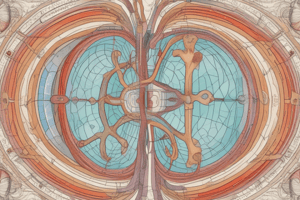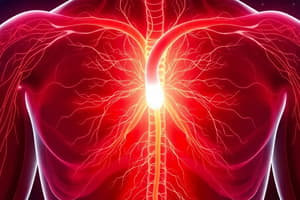Podcast
Questions and Answers
Which of the following best describes blood pressure?
Which of the following best describes blood pressure?
- The speed at which your blood flows through your body
- The amount of force your blood uses to get through your veins
- The pressure of blood pushing against the walls of your arteries (correct)
- The amount of oxygen in your blood
What is the role of baroreceptors in the autonomic nervous system?
What is the role of baroreceptors in the autonomic nervous system?
- To regulate heart rate
- To regulate blood pressure (correct)
- To regulate oxygen levels in the blood
- To regulate blood sugar levels
Where are baroreceptors located in the body?
Where are baroreceptors located in the body?
- Near the liver
- Near the kidneys
- Near the heart by the aorta and by the carotid (correct)
- Near the lungs
What is the function of pressorreflexes?
What is the function of pressorreflexes?
Which part of the autonomic nervous system do baroreceptors send afferent nerve fibers to?
Which part of the autonomic nervous system do baroreceptors send afferent nerve fibers to?
What happens to blood vessels when arterial pressure rises?
What happens to blood vessels when arterial pressure rises?
How does the heart rate change when arterial pressure rises?
How does the heart rate change when arterial pressure rises?
Flashcards
Blood pressure definition
Blood pressure definition
The force of blood against artery walls
Baroreceptor role
Baroreceptor role
Regulates blood pressure in the autonomic nervous system
Baroreceptor location
Baroreceptor location
Near the heart (aorta) and neck (carotid arteries).
Pressorreflex function
Pressorreflex function
Signup and view all the flashcards
Afferent nerve fiber destination
Afferent nerve fiber destination
Signup and view all the flashcards
Blood vessels reaction to high pressure
Blood vessels reaction to high pressure
Signup and view all the flashcards
Heart rate change with high pressure
Heart rate change with high pressure
Signup and view all the flashcards
Study Notes
Blood Pressure and Baroreceptors
- Blood pressure is the force of blood pushing against the walls of arteries as the heart pumps blood.
- Baroreceptors play a crucial role in the autonomic nervous system, helping to regulate blood pressure by sensing changes in arterial pressure.
Location and Function of Baroreceptors
- Baroreceptors are located in the walls of certain arteries, particularly in the carotid sinus and aortic arch.
- The primary function of baroreceptors is to detect changes in arterial pressure and send signals to the brain, which then responds to maintain blood pressure within a normal range.
Pressor Reflexes
- Pressor reflexes are a type of reflex that helps to increase blood pressure when it falls, and decrease blood pressure when it rises.
- The function of pressor reflexes is to maintain blood pressure homeostasis by stimulating the heart to beat faster or slower, and constricting or dilating blood vessels as needed.
Baroreceptors and the Autonomic Nervous System
- Baroreceptors send afferent nerve fibers to the medulla oblongata in the brain, which is part of the autonomic nervous system.
- The autonomic nervous system processes the signals from baroreceptors and responds by stimulating the heart and blood vessels to make necessary changes to maintain blood pressure.
Effects of Arterial Pressure Rise
- When arterial pressure rises, blood vessels constrict or vasoconstrict, which decreases blood flow to certain areas of the body.
- The heart rate slows down in response to a rise in arterial pressure, as the body does not need to pump as much blood to maintain the increased pressure.
Studying That Suits You
Use AI to generate personalized quizzes and flashcards to suit your learning preferences.




